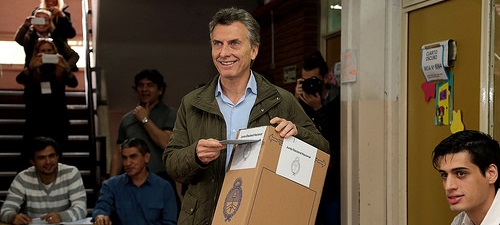 |
| Mauricio Macri's hold on La Casa Rosada lightly reinforced by small gains at the Argentina legislative midterms. Photograph: La Casa Rosada from Pixabay (License) (Cropped) |
The midterm elections in Argentina did little to settle the future of Argentina. President Mauricio Macri's movement gained a few seats, just enough to keep his project rolling forward.
That Macri's project is essentially austerity in a more extreme context is important for progressives to consider. It presents the epitome of what the Centre-Right consider the justification for strong dose of 'realism', but raises the question of why that has to be delivered in the form of harsh measures?
The Midterms elections covered a third of the Senate and half of the lower House. It would have been hoped by Cambiemos to be an opportunity to reinforce Macri's presidency with a stronger legislative contingent - just 16 of 72 in the Senate, with just 86 Deputies out of 257 in the Chamber, to around 46 and 105 for various Justicialist groups combined, respectively.
The four biggest parties each had about half of seats their Chamber seats up for reelection, while most of the Senate seats were being defended by Justicialists (Peronists).
As it happened Cambiemos made gains, though they were few. The coalition took 19 seats, not enough reach a majority, while those were offset by the 25 seats gained by former President Cristina Fernandez de Kirchner, rallying voters from various populist parties to her particular faction.
Even if this result is more than Macri and Cambiemos might have feared, it is still less than they will have hoped. Part of the reason why may be that, after two years in office, Macri has yet to deliver a deep sea shift in the country's economic condition.
That shouldn't really be a massive surprise, because two years is nothing. But the public are restless and what Macri has asked for is a huge change in approach from the Kirchnerist-Peronist years.
Not least are the cuts to subsidies that help with the cost of living for low income families. This is the austerity programme familiar to many progressives around the world.
In Argentina this has particular significance. In reason years, at the least, the Kirchnerist-Peronist populists - especially under the presidency of Cristina Fernandez de Kirchner - have tended to offer up big promises, comfortable lies to package harder truths and deeper crises.
Of relevance to all of those resisting austerity is the response of Centre-Right, Argentina as elsewhere: to serve up cold reality and a cold shoulder.
The Cambiemos coalition, that Macri has serving up a meagre helping, includes most of Argentina's Centre and Soft Left - social democrats and social liberals - and you have to wonder have these partners feel about their direction.
Macri has bet the house on austerity, in the meantime putting the poorest in some jeopardy, gambling that foreign private investors will step in and take a chance on Argentina. But it's yet to pan out that way.
The midterms buy Macri some space. Over that past year he has poured the blame for the present situation on the Kirchner "K" movement - calling it the "K Inheritance", probably fairly. But that approach will only work for so long.
Cristina Fernandez de Kirchner is already building for a comeback, taking seats at the midterms while Macri's approval ratings hover dangerously low at 41%/46% (approve/disapprove).
Macri has offered some consolation to his Cambiemos partners. Last year he announced what he called a 'Marshall Plan' - a reference to the huge public investment made by the US government in it's allies after World War II.
In reality, it was a public-private investment initiative foucsed on lowering the cost of business - in that conservative vein of reduced costs hopefully leading to reduced prices and reduced cost of living.
But these pledges are coming alongside efforts to force Trade Unions and dockworkers to accept pro-competition measures - and while cornered, they are far from convinced.
All of this leads back to the central question. Populists offer an unrealistic view smothered in giveaways and the Right demand a reaction steeped in a cold austere reality. The question is, why can't we address reality with warmth?
Why is it so difficult to imagine a compassionate realism? To pursue a course that does not abandon the most vulnerable to the mercy of corporate interests and charity, when righting a sinking ship.
Politics in Argentina is raising this question. Progressives and their allies the world over need to find a way to respond.


